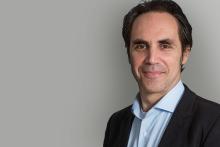Media ownership comes under the spotlight ahead of UK general election
A pledge put forward in the Labour Party's election manifesto has drawn ire from media baron Rupert Murdoch as it threatens to reduce his family's control of British media.
The ageing billionaire has reportedly told staff at his British newspapers that a Labour-led government may lead to the break up of their employer, and told journalists to give more positive coverage to the Conservative Party, which hasn't published a media ownership policy.
The Labour Party's election manifesto states: “No one media owner should be able to exert undue influence on public opinion and policy makers.”
Professor Robert Picard, media economics specialist at the Reuters Institute for the Study of Journalism at Oxford University, says most countries have policies in place controlling ownership of media.
Murdoch currently controls 34% of UK media, and his influence in the public sphere was called into question during 2012's Leveson Inquiry, which examined the ethics and culture of British press.
The Murdochs are not the only family with significant media interests in the UK.
Daily Mail & General Trust has been controlled by the Harmsworth family for four generations, the Barclays brothers own the Telegraph Media Group, and the Lebedev brothers own the Evening Standard and the Independent.
This week, US media baron, and former New York mayor, Michael Bloomberg penned an online editorial urging British voters to back David Cameron; however, his reasoning was based on business, rather than media, policy.
He is the owner of business media outlet Bloomberg, which is currently building a new European headquarters in London.
Labour isn't the only party hinting it would cap media ownership by families or wealthy individuals.
The Green Party wants no individual to own more than 20% of British media, while the Liberal Democrats has called for the government's media regulatory body to have more power to encourage competition.
Picard says in a country as large as Britain it is unusual for one family to own control a third of the media.
“France has had for some time a limit on 30% ownership of the newspaper market. In the UK and Germany, both went to an arrangement about 20 years ago when they began looking at audience share and not just circulation so they could look across things.”
The media economics expert said most family-owned media empires have a cultural and political service bent due to their long history of ownership. He says they believe editorial integrity will ensure the business is passed on to the next generation.
“There are certainly other family-controlled media empires that have influence on political discussion, but Murdoch differs in that he's driven more by business ambition than ideology,” he said, suggesting Murdoch's US citizenship may mean he does not feel the same social responsibility as someone that is a UK resident.
Picard adds: “Murdoch is happy to move from one side to the other, from Conservative to Labour or Republican to Democrat, cosying up to power and using media to punish those he does not like. Most family companies don't do that.”
Picard argues, however, that Murdoch's influence on UK's media has not been altogether negative, and that the octogenarian was able to save a number of ailing UK newspapers and help modernise the industry in terms of production.
“Obviously he is doing it for his own purposes and other gain, but many proprietors do that,” he said. “Not everyone is going to like their conservative stance but he has kept a national institution going.”
The UK is currently governed by the “20-20” rule – sometimes dubbed the “Murdoch clause” – which prevents any person who owns a national newspaper group from holding more than 20% of an independent TV service.
Murdoch sought to increase his share of British Sky Broadcasting in March 2011 and the UK government originally approved the deal. However, the News of the World hacking scandal and subsequent Leveson Inquiry has put the brakes on the deal.






